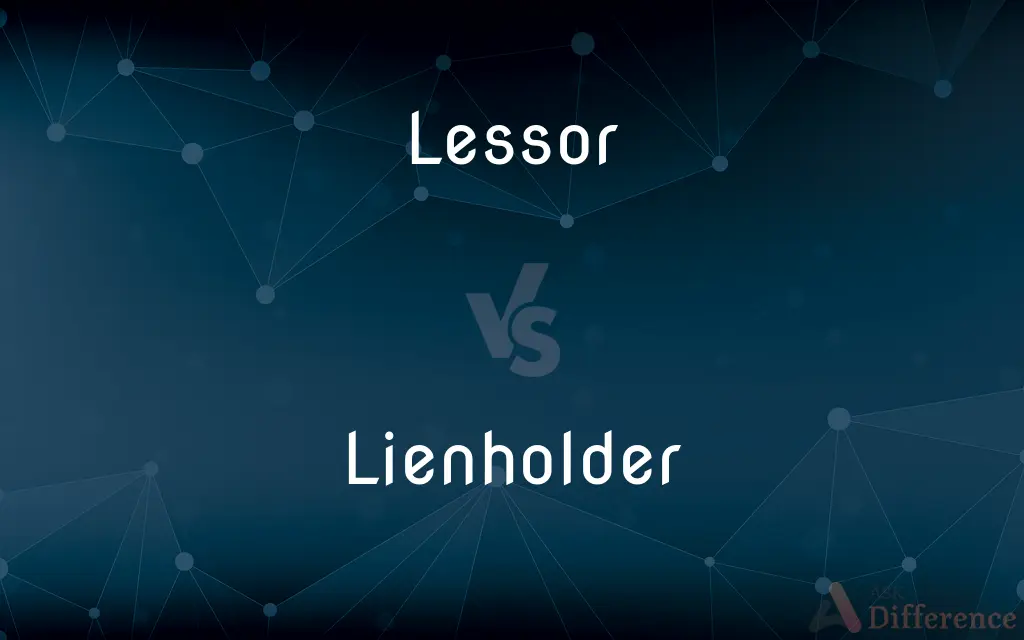Lessor vs. Lienholder — What's the Difference?
By Tayyaba Rehman — Updated on November 4, 2023
A lessor owns an asset and grants its use to another under a lease; a lienholder has a legal claim on an asset until a debt is paid.

Difference Between Lessor and Lienholder
Table of Contents
ADVERTISEMENT
Key Differences
A lessor is someone who grants the use of their property to another party through a lease agreement. On the other hand, a lienholder is an entity that has a legal claim or a right over a property until a debt owed by the property owner is paid off. While a lessor holds the title to the property, they do not have a lien on it. However, a lienholder may not own the property but has a financial claim that could affect ownership.
The role of a lessor is to provide property for use, often in exchange for regular payments. A lienholder, however, does not provide the use of the property but has a security interest in the property. For example, a lessor of a car allows someone to drive it for payments, while a lienholder on the car may be the bank that provided the loan to purchase it. While both terms deal with property rights, the lessor is concerned with the utilization of the asset, and the lienholder is concerned with the security of their financial interest.
In terms of rights, a lessor has the right to receive lease payments as agreed upon in the lease contract and to get their property back after the lease term ends. A lienholder, however, has the right to take possession of the property if the debtor fails to fulfill the financial obligations. The lessor's main concern is maintaining the value of their asset and ensuring its return, while the lienholder's concern is the repayment of the debt.
Both lessors and lienholders must safeguard their rights legally; lessors through lease agreements, and lienholders through liens. Lease agreements are contracts that stipulate the terms of use, while liens are claims registered to public records, indicating the lienholder’s interest in the property. A lessor can become a lienholder if they lease a property with an option to buy and take a security interest in it, but these roles are typically separate in transactions.
Comparison Chart
Relationship to Property
Grants use of property
Holds claim on property
ADVERTISEMENT
Interest in Property
Owns the property
Has financial interest
Source of Rights
Lease agreement
Lien
Purpose
To earn income from property
To secure debt repayment
Action upon Default
May evict lessee
May repossess or foreclose
Compare with Definitions
Lessor
Owner
The lessor retains ownership of the leased apartment.
Lienholder
Security
The lienholder has a security interest in the financed vehicle.
Lessor
Property
A lessor may lease out both residential and commercial spaces.
Lienholder
Claim
The bank became a lienholder when the mortgage was signed.
Lessor
Rent
A lessor collects monthly rent for the use of their property.
Lienholder
Debt
A lienholder must be satisfied before the title is clear.
Lessor
Agreement
The lessor entered into a lease agreement with the tenant.
Lienholder
Legal
The lienholder's claim is recorded with the county clerk.
Lessor
Rights
The lessor has the right to inspect the property with proper notice.
Lienholder
Interest
A lienholder may foreclose if debts are not paid.
Lessor
One who leases property; a landlord.
Lienholder
(legal) Used in instances of title of property (such as a vehicle) to refer to the person who has right of property, as opposed to the party that merely has right of possession. The party that only has right of possession is referred to as a registered owner, and in the event the registered owner fails to pay off the lien according to the agreed-to terms, the lienholder has the right to invoke repossession of the property (vehicle).
Lessor
(property law) The owner of property that is leased; the landlord to a lease.
Lessor
One who leases; the person who lets to farm, or gives a lease.
Lessor
Someone who grants a lease
Common Curiosities
Can a lessor sell the property during the lease term?
Yes, but the lease agreement typically remains in effect.
How does a lessor make money?
Through the collection of rent or lease payments.
What is a lessee?
The party that leases property from the lessor.
Can there be multiple lienholders on one property?
Yes, but they have different priority levels.
Who can be a lessor?
Any individual or entity that owns property and is willing to lease it out.
How does a lienholder enforce their rights?
Through repossession or foreclosure in the event of non-payment.
Can a lessor also be a lienholder?
Yes, if they lease-to-own and retain a security interest.
Is a lienholder the owner of the property?
No, they hold a security interest but do not necessarily own it.
Can a lienholder take possession if the property is sold?
They must be paid off or agree to transfer the lien to the new owner.
Can a lessor evict a tenant for non-payment?
Yes, following legal procedures for eviction.
Does a lessor need insurance on the leased property?
Yes, lessors typically require insurance to protect their property.
Who can be a lienholder?
Typically a lender or financial institution, but also any creditor with a legal claim.
What happens when a lien is paid off?
The lienholder releases their claim on the property.
What legal documents does a lessor use?
A lease agreement outlining the terms and conditions of the lease.
What is a lien release?
A document a lienholder provides once the debt is paid, removing the lien.
Share Your Discovery

Previous Comparison
Passionate vs. Passionately
Next Comparison
Sketch vs. DoodleAuthor Spotlight
Written by
Tayyaba RehmanTayyaba Rehman is a distinguished writer, currently serving as a primary contributor to askdifference.com. As a researcher in semantics and etymology, Tayyaba's passion for the complexity of languages and their distinctions has found a perfect home on the platform. Tayyaba delves into the intricacies of language, distinguishing between commonly confused words and phrases, thereby providing clarity for readers worldwide.













































